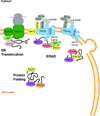Protein folding and secretion: mechanistic insights advancing recombinant protein production in S. cerevisiae
- PMID: 25032908
- PMCID: PMC4253588
- DOI: 10.1016/j.copbio.2014.06.018
Protein folding and secretion: mechanistic insights advancing recombinant protein production in S. cerevisiae
Abstract
The emergence of genomic approaches coupled to recombinant DNA technologies have identified the quality control systems that regulate proteostasis - biological pathways that modulate protein biogenesis, maturation, trafficking, and degradation. The elucidation of these pathways has become of growing importance in therapeutics as loss of proteostasis has been suggested to lead to a number of human diseases including Alzheimer's, Parkinson's Disease and Type II Diabetes. We anticipate that the most successful strategies for protein expression and therapeutics development may involve integration of protein engineering strategies with host manipulation, to exploit the cell's native stress response pathways and trafficking mechanisms. This review will highlight recent findings and mechanistic detail correlated to quality control in the early secretory pathway of Saccharomyces cerevisiae.
Copyright © 2014 Elsevier Ltd. All rights reserved.
Figures


Similar articles
-
Yeast synthetic biology for designed cell factories producing secretory recombinant proteins.FEMS Yeast Res. 2020 Mar 1;20(2):foaa009. doi: 10.1093/femsyr/foaa009. FEMS Yeast Res. 2020. PMID: 32009173 Review.
-
Metabolic engineering of recombinant protein secretion by Saccharomyces cerevisiae.FEMS Yeast Res. 2012 Aug;12(5):491-510. doi: 10.1111/j.1567-1364.2012.00810.x. Epub 2012 May 17. FEMS Yeast Res. 2012. PMID: 22533807 Review.
-
Engineering protein folding and translocation improves heterologous protein secretion in Saccharomyces cerevisiae.Biotechnol Bioeng. 2015 Sep;112(9):1872-82. doi: 10.1002/bit.25596. Epub 2015 Jun 30. Biotechnol Bioeng. 2015. PMID: 25850421
-
The MFα signal sequence in yeast-based protein secretion: challenges and innovations'.Appl Microbiol Biotechnol. 2025 Jun 5;109(1):138. doi: 10.1007/s00253-025-13532-z. Appl Microbiol Biotechnol. 2025. PMID: 40471355 Free PMC article. Review.
-
Engineering the protein secretory pathway of Saccharomyces cerevisiae enables improved protein production.Proc Natl Acad Sci U S A. 2018 Nov 20;115(47):E11025-E11032. doi: 10.1073/pnas.1809921115. Epub 2018 Nov 5. Proc Natl Acad Sci U S A. 2018. PMID: 30397111 Free PMC article.
Cited by
-
IRE1α Implications in Endoplasmic Reticulum Stress-Mediated Development and Pathogenesis of Autoimmune Diseases.Front Immunol. 2018 Jun 6;9:1289. doi: 10.3389/fimmu.2018.01289. eCollection 2018. Front Immunol. 2018. PMID: 29928282 Free PMC article. Review.
-
Overexpression of genes by stress-responsive promoters increases protein secretion in Saccharomyces cerevisiae.World J Microbiol Biotechnol. 2023 May 20;39(8):203. doi: 10.1007/s11274-023-03646-9. World J Microbiol Biotechnol. 2023. PMID: 37209206
-
Protein folding: Illuminating chaperone activity.Nat Chem Biol. 2017 Mar 22;13(4):346-347. doi: 10.1038/nchembio.2332. Nat Chem Biol. 2017. PMID: 28328919 No abstract available.
-
Yeast-based directed-evolution for high-throughput structural stabilization of G protein-coupled receptors (GPCRs).Sci Rep. 2022 May 23;12(1):8657. doi: 10.1038/s41598-022-12731-2. Sci Rep. 2022. PMID: 35606532 Free PMC article.
-
Quantitative Analyses of the Yeast Oxidative Protein Folding Pathway In Vitro and In Vivo.Antioxid Redox Signal. 2019 Aug 1;31(4):261-274. doi: 10.1089/ars.2018.7615. Epub 2019 Apr 25. Antioxid Redox Signal. 2019. PMID: 30880408 Free PMC article.
References
-
- Walsh G. Post-translational modifications of protein biopharmaceuticals. Drug discovery today. 2010;15(17–18):773–780. - PubMed
-
- Berlec A, Strukelj B. Current state and recent advances in biopharmaceutical production in Escherichia coli, yeasts and mammalian cells. Journal of industrial microbiology & biotechnology. 2013;40(3–4):257–274. - PubMed
-
- Goodman M. Market watch: Sales of biologics to show robust growth through to 2013. Nature reviews Drug discovery. 2009;8(11):837. - PubMed
Publication types
MeSH terms
Substances
Grants and funding
LinkOut - more resources
Full Text Sources
Other Literature Sources
Molecular Biology Databases

